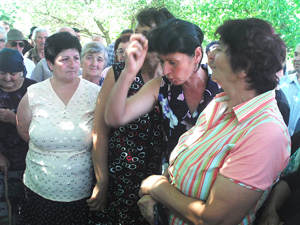Saba Tcitcikashvili, Shida Kartli
It’s currently prohibited to enter the Zemo Niqozi village without official identification cards. Georgian armed forces located at the entrance are strictly controlling the traffic in and out of the village. A representative from The Human Rights Center’s Gori office witnessed an incident in the village that was located near the front line in August war.
Special Forces officials tried to stop a lady with no passport. The woman was taking a bus from Tbilisi with a countrywoman and as she stated, she accidentally forgot her identification card at home. Citizens were explaining to the police officials that she was a local resident, but they paid no attention to them. We stated that we didn’t have an identification card either and then that resulted in them attempting to arrest us. When they were told that we were journalists they quickly reconsidered and released us. We were warned never to enter Niqozi without passports again.
Tskhinvali buildings and their red roofs are clearly visible from Niqozi. Police officers are standing at the entrance of the village and patrolling within. They control everything including who can reside in the villages.
There is a dam at the entrance of the village. In all actuality, it is really a reservoir that simply redirects water in different directions, specifically to Ergneti.
As the supervisor of Niqozi reservoir, Tamaz Babutsidze, told us that this water irrigates Ergneti, Megvrekisi and the surrounding villages. The neighboring villages of the reservoir, Niqozi and Khviti, are dried up because of a lack of supply. Gori municipality governor, David Khmiadashvili, states that the transfer of water to Niqozi direction is planned for the next year. We don’t yet know whether or not this project works since there are still problems in the area where the water would be transferred to as well. Much of the challenges are connected to electrical fees.
The company “Mtkvai M” is so greedy that it asks for money at every meeting and with every comment. This happens despite the fact that this organization is receiving a considerate amount of money from the state, Gori and Kaspi budgets. For example, the Gori municipality transfers 200,000 lari a year and Kaspi municipality also contributes a fair amount.
The Human Rights Center’s Gori office is going to search for all possible finance sources, that will be covered by company “Mtkvari M.” However, the situation in Niqozi still leaves many other questions to be answered.
The irrigation canal is all dried up. It’s obvious that water seldom runs there. The orchards are almost withered and the grass has turned yellow from the lack of water. Locals tell us that Tskhinvali only transfers water to their city when it needs it for sewage treatment.
Additionally, a couple of days ago, at the meeting with the region governor, Zurab Arsoshvili, the district Governor, David Khmiadashvili, stated that since Ossetians transferred the water, there has been no problem at all. However, we witnessed a different situation in the village. Niqozians said that the flow of water continued only for couple of nights.
“During this time, only the land situated nearby gets irrigated. I can’t really go to this land to get water since it’s possible that a neighbor might hit you with a spade and kill you. Why should I be murdered for 50 tomatoes?” said one resident of Niqozi.
Gas pipes constructed in Upper Niqozia are also damaged. The pipes have been pierced and the chances for providing gas are rare. Niqozians say, that during construction they used old pipes. Electricity is also a source of numerous problems. For example, Niqozians complained to National Forum Leader, Gubaz Sanikidze, that despite the individual numerator system that has been constructed, the population still has to pay an increased electricity tariff. It should be also noted, that at the meeting with the Governor, the Gori Municipality
Director stated that everything is fine in regards to this topic.
News
December 13, 2023
Ethnic minorities outside the peace dialogue
November 6, 2023
‘Peace’ agenda of political parties
Popular
Articles
February 13, 2024




